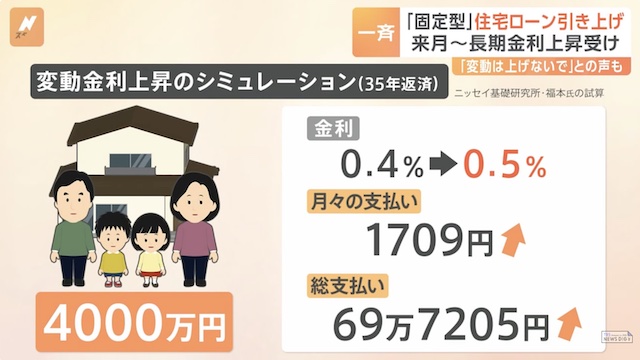TOKYO, May 31 (News On Japan) - With long-term interest rates rising steadily, Japan's major banks have announced a significant increase in fixed-rate mortgage interest rates starting next month.

In a showroom of a housing manufacturer in Tokyo, the excitement of choosing a new home is tempered by concerns over rising mortgage interest rates.
'I'm a bit anxious. I'm worried that rates will go up.'
Many are worried about the impact of rising mortgage interest rates.
Homebuyers can choose between fixed-rate mortgages, where the interest rate remains unchanged for a set period, and variable-rate mortgages, which are reviewed every six months and usually have lower rates compared to fixed-rate loans.
Due to the continuous rise in long-term interest rates, which have exceeded 1%, major banks announced the second consecutive increase in fixed-rate mortgages, effective next month.
As a result, approximately 90% of customers at this housing manufacturer are opting for variable-rate mortgages.
'Currently, borrowing with a variable rate is expected to result in lower total payments, so I chose the variable rate.'
'I didn't consider the fixed rate option. I chose the one with the lower rate.'
What lies ahead for mortgage interest rates?
Since the Bank of Japan (BoJ) ended its negative interest rate policy, fixed-rate mortgage rates have started to climb. However, the rates for variable-rate mortgages, chosen by most people, may also rise depending on the BoJ's decisions.
Today, the yen stood at 157 yen to the dollar, and the prolonged yen depreciation continues to strain household finances.
The main reason for the yen's depreciation is the interest rate differential between Japan and the US. There is speculation in the market that the BoJ might expedite the normalization of monetary policy, including additional interest rate hikes, to curb the yen's depreciation. If the BoJ decides to raise short-term interest rates, it could lead to an increase in variable-rate mortgage interest rates, resulting in higher repayment amounts.
According to estimates by the Nissei Basic Research Institute, if a 40 million yen mortgage has its interest rate increased by 0.1%, the monthly repayment would increase by 1,700 yen, amounting to an additional 700,000 yen over the loan term.
Yuki Fukumoto, Head of Financial Research at Nissei Basic Research Institute, said, 'The financial market is moving with the expectation that there could be one or two rate hikes by the BoJ this year.'
'Honestly, I don't want variable rates to rise.'
'If interest rates go up, we'll need to reconsider our expenses.'
To curb the yen's depreciation, raising interest rates might increase mortgage repayment amounts, posing new financial burdens. The BoJ's decisions will have a significant impact on the future of household finances.
Source: TBS















